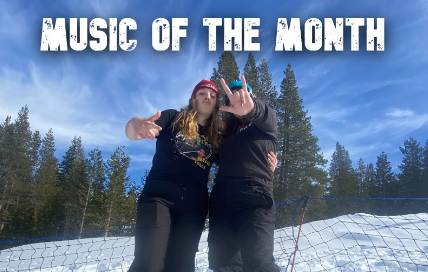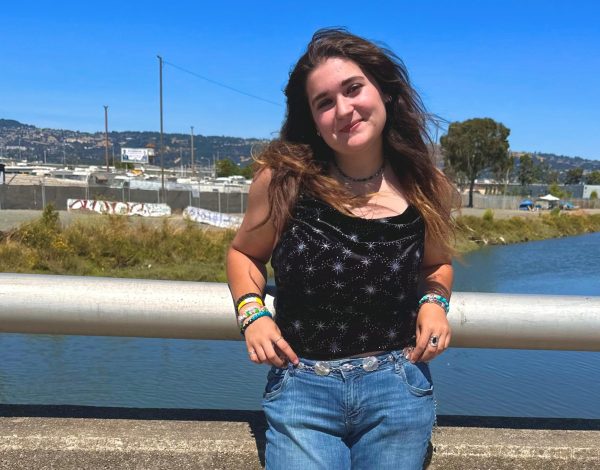Music of the Month: February

Cali and Brianna compile a list of their top songs each month and go in depth with them.
March 20, 2023
In honor of the month of all things love, we decided to write about a few of our favorite endearing tracks that depict many forms of love. We hope you enjoy this month’s edition of “Music of the Month!”
Cali’s picks:
“Here, There and Everywhere” by The Beatles, “Revolver” (1966)
Serving as the fifth song on The Beatles’ experimental seventh album, “Revolver”, “Here, There and Everywhere” is a simplistic and twee love song that epitomizes the longing felt when in love. Influenced by the Beach Boys’ hit “God Only Knows” (which was in turn inspired by the Beatles’ album “Rubber Soul”), the number is entirely composed by bassist and singer Paul McCartney and is the only composition where John Lennon praised McCartney’s songwriting abilities. The ditty starts off with George Harrison’s resonating guitar chords and McCartney’s soothing voice as the band takes the listener on a musically whimsical journey. While the verses are smooth and charming, the choruses take on a slightly minor tone indicated through Harrison’s staccato, yet warm solos. Each chorus begins with the sweet phrase “I want her everywhere,” showing McCartney’s devotion as he is upheld by Ringo Starr’s rhythmic drumming. Throughout the moving track, Lennon and Harrison vocally contribute with their blissful and harmonious backing vocals that transcend the number while effectively accompanying McCartney’s lead vocals. Clocking in at just under 2:30, the song has faced much accolade as Mojo Magazine considered it the fourth greatest song ever written, and it is adored by fans and critics alike.
“Thank You” by Led Zeppelin, “Led Zeppelin II” (1969)
One of the most cherished love songs in rock music, “Thank You” is an emotional masterpiece that expresses the feelings of helpless devotion towards a significant other. The number was completely written by lead singer Robert Plant – a rarity for Zeppelin at the time – as a tribute to his then-wife Maureen. Beginning with a comforting organ note played by bassist John Paul Jones and Jimmy Page’s acoustic guitar that gradually grows in volume, the song serves as the fourth track on Led Zeppelin’s iconic sophomore album, “Led Zeppelin II.” In the first verse, Plant uses imagery like “If the sun refused to shine” and “When mountains crumble to the sea” (both lines taken from Jimi Hendix’s song “If 6 Was 9”) to explain that he would “still be loving” his significant other, even in the most drastic of situations. The verses are void of all instruments, besides Jones’ symphonic organ and Plant’s melodious voice until the pre-chorus where Page’s driving acoustic guitar and John Bonham’s pounding drums join in. The choruses draw the tune to a climactic point where each instrument blends beautifully with Plant’s lead vocals as well as Page’s euphoric backing vocals. Following the first chorus, Page breaks away into a sharp and exuberant solo, one of his only acoustic guitar solos in Led Zeppelin’s discography. After this extended solo, the composition fades back into the verse structure before going into a reprise of the first verse and the elongated organ outro played flawlessly by Jones. Covered by the likes of Chris Cornell, Tesla, Tori Amos, and Duran Duran, the strikingly romantic composition is regarded as a fan favorite and has been used as a first dance song for many.
“Incinerate” by Sonic Youth, “Rather Ripped” (2006)
With an illustrious career in alternative and noise rock which began in the early ‘80s, Sonic Youth showcased their musical adaptability and ingenious songwriting in this fulfilling and emotion-filled number. Serving as the lead single and the second track on their 14th studio album, guitarist, singer, and primary lyricist Thurston Moore uses the extended metaphor of incineration to describe the intense, burning passion felt when one is deep in love. The sweet ditty kicks off with an echoey, yet hard-hitting riff that drives the band into the harmonious intro that is filled with Moore and Lee Ranaldo’s dreamy coinciding guitars. Following this extended intro, Kim Gordon begins playing her whimsical, yet booming bass that accompanies the soloing guitar and Moore’s apt voice to begin the first verse. There is little distinction between verse and chorus as they mellowly blend together until the brief instrumental break that comes after the first chorus. Following the identical second verse and chorus, the band breaks away into a noisy and sporadic instrumental break that adopts their signature style while continuing the more structured manner of the track as the solo dissipates back into the powerful opening riff and the final breathtaking verse. After this verse, the song bleeds into a dreamy intro where Moore repeats “Incinerate” as the chorus instrumentals support him until the gradual quieting and fade out occur. Although the track is a somewhat anomaly in Sonic Youth’s catalog, it quickly became a fan favorite and one of their most well-known songs.
“Echo” by Incubus, “Morning View” (2001)
“Echo” is a soothing, beautiful love song that serves as the ninth track on Incubus’ essential fourth studio album, “Morning View.” Starting with Mike Einziger’s comforting guitar, the tune immerses the listener into a symphonically euphoric world through Brandon Boyd’s ethereal voice and the alternate instruments heard in the breaks and solos. The first verse features the smooth accompaniment of Einziger’s triad-based riffage, Jose Pasillas’ melodic percussion, and Boyd’s hypnotically rapturous vocals. Each verse nicely flows into the choruses that are riddled with captivating harmonies, quaint drums, subtle synth trills, and faintly marvelous guitar playing. Following the first chorus, Einziger breaks away into a warm guitar solo that resembles the sound of the koto, a Japanese instrument used in other Incubus works. Boyd exhibits his impressive vocal prowess by ranging in volume and pitch throughout the composition. After the last chorus, a sweeping synth note overshadows the tune as Einziger’s guitar slows down and the song comes to a halt. Even though “Morning View” is an album that contains many songs that address heartache and breakup, Incubus creates a timeless alternative love song through expressive lyrical imagery and outstanding musicianship and vocals.
“Falling for You” by Weezer, “Pinkerton” (1996)
A heartfelt ditty that depicts the feelings of infatuation that lead to strong praise of that person, but contrasting self-deprecation, as it seems you will never be good enough for that person. The penultimate track on Weezer’s cult classic sophomore album, “Pinkerton,” the sweet tune begins as the final chords of the preceding song, “Pink Triangle” bleed into the chiming guitar riff and the very faint Korean radio ad that interfered with lead singer and guitarist Rivers Cuomo’s amp. This repeating intro riff, courtesy of Brian Bell, is smoothly accompanied by Cuomo’s mellow solos which increase in volume and intensity until they become driving power chords that kick off the first verse. Each verse begins with an expressive interjection phrase (“Holy cow,” “Holy moly,” and “Holy sweet” respectively) which exemplify truly how much the subject means to the narrator, as he goes on to list how their great qualities leave him in a lovesick state of confusion and admiration. Although the verses are mainly carried by the loud chord progression, a subtle tremolo-picked soloing guitar can be heard, adding symphonic depth to the blissful number. Following a short burst of feedback and a slight return of the intro riff, the first verse flawlessly transitions into the angsty choruses fueled by Bell and Cuomo’s guitars, Patrick Wilson’s booming drums, and Cuomo’s glorious wails that express why he likes the subject “way too much.” Dividing each chorus and verse section is a minor-sounding solo delivered by Cuomo that coincides with Matt Sharp’s declining bassline before starting the second verse with Wilson’s crashing cymbal. After the second chorus, the band breaks into a riveting instrumental break where Cuomo plays a quaint solo that fades into the differing third and final verse that carries a higher energy than the two previous verses. Following the last chorus, the band enters an outro that features the harmonized repetition of the line “Down with you,” along with sporadic guitar chords and pounding drums until cutting out to the deafening roars of feedback. Although the number isn’t considered a typical love song, it beautifully orchestrates the relatable worries and fleeting feelings of having a crush.
Brianna’s picks:
“Walking After You” by Foo Fighters, “The Colour and the Shape” (1997)
Opening with reverberating cymbals, Foo Fighters present “Walking After You” with two versions: the studio album version, running slightly longer and containing more unplugged qualities, and a soundtrack re-recording for the sci-fi series “The X-Files.” Dave Grohl’s melancholic, whisper-like vocals and his droning vocalise prior to the dulcet chorus are reminiscent of his previous mellow tracks such as “Color Pictures of a Marigold,” which became Nirvana’s “Marigold,” and “Friend of a Friend” from his solo demo album “Pocketwatch,” recorded during his time in Nirvana. In support of his powerful sentiments, Grohl recorded all of the instruments for the studio with the exception of Foo Fighters’ other esteemed member Nate Mendel on bass. Because of his love for the series, Grohl and his then-wife, Jennifer Youngblood, made a brief, three-second cameo in season three, episode 17. The soundtrack version of “Walking After You” further indoctrinates Taylor Hawkins more into the “Foo-scene,” as it features additional advanced and intricate drumming compared to the studio album recording. The consistent sweet tone throughout the track, balanced with the melodic guitar and melancholy vocals, creates a beautiful message to love within Foo Fighters’ early discography. With the gorgeous outro well on its way, Grohl and Mendel close the ballad with diminishing instrumentals.
“First In Line” by Elvis Presely, “Elvis” (1956)
As his first album released under RCA, Elvis Presely opens the fifth track of his sophomore studio record with echoed vocalization (to which the effect is also applied to his lead vocals) and suppressed instrumentation that plays the key role of supporting Presely’s iconic vocals and register. The lyrics speak for themselves: as the vocals are the prominent feature of the track, it’s easier to isolate the bittersweet message that your first love is your last. Presley opens the heartfelt track with the gorgeous lyrics “When they gave out eyes like diamonds/ That would shame the stars that shine.” In addition to his vocals, Presley contributes to the ballad with piano and an acoustic rhythm guitar. “First In Line” is the first song to include Ben Wiesman as a contributing songwriter. Wiesman went on to be Presely’s most prevalent writer throughout his career. The instrumentation provides a steady beat and ceases for the lyric “Any stronger than I do.” Presley commits to the isolated vocals by ending the track with the song’s title, a run of vocalise and an exit note from the piano.
“Hard to Concentrate” by Red Hot Chili Peppers, “Stadium Arcadium” (2006)
Refreshing and vulnerable, Red Hot Chili Peppers’ esteemed musicians open the 17th track with engrossing instrumentations: Chad Smith’s pattering percussion, Flea’s backboned bass, and John Frusciante’s synthesized-like squire. Dissimilar to RHCP’s expected sound, Anthony Kiedis exuberates soft vocals that are filled with vows and stylized with enjambment, which encourages the listener to continue their engagement with the sincere track. Kiedis wrote this track in a joyous response to the band’s bassist and his childhood friend Flea’s wedding to his then-wife Frankie Rayder. Regarded as RHCP’s finest love song, “Hard to Concentrate” is about finding the one you are going to spend the rest of your life with. Kiedis also provides beautiful literary styles, especially in the lyric “Estuary is blessed but scary” ― the process of a single stream joining into a larger body of water. The song’s entirety goes in depth with the process of departing from the comfort of the ‘bachelor life’ along with the surfacing fear of giving up independence as a whole. Frusciante continuously fades out the volume on his strat, a simple effect that goes miles for the delicate and harmonized guitar lines. The third track on the Mars side (resembling the b-side or “side two” on records), “Hard to Concentrate” offers an alluring breakdown and closes the track with the first few lyrics of the bridge.
“F.N.T.” by Semisonic, “Great Divide” (1996)
Erupting into an iconic guitar tone of the ‘90s, “F.N.T.” presents an upbeat homage to a newly developed relationship ― or rather lack thereof as the narrator pines after the person. With the lucidly expressed lyrics by Semisonic’s drummer Jacob Slichter and guitarist/vocalist Dan Wilson, “F.N.T.” uses a type of abbreviation called initialism; consisting of the line “Fascinating new thing” opening the first and second verse, and the repeating outro. Semisonic’s shortened title is still recognizable and established its prominence in late ‘90s films, first appearing in the 1996 action and mystery film “The Long Kiss Goodnight,” including starring actors Geena Davis, Samuel L. Jackson, and Craig Bierko. Just three years later, “F.N.T” made its most notable movie emergence in the staple romcom “10 Things I Hate About You” (1999), playing at the forefront during the iconic date scene where Patrick and Kat partake in a unique and more tame version of paintballing. “F.N.T.” sets an undeniable tone and environment of the discovery of a new likeness towards someone. Following the second-to-last chorus of the track, Wilson delves into a primitive set of vocalise and is succeeded by his strong guitar solo. Semisonic ends the track alternating between the lead and supporting vocals of the extended title.
“My Love, My Life” by ABBA, “Arrival” (1976)
The thought and emotion-provoking vocals of Agnetha Fältskog for the sumptuous track off of ABBA’s fourth studio album stands the test of time. Transcending through a blanket of light air, Fältskog utilizes her delicate and gorgeous vocals supported by the non-lexical vocables and rounds. Written by Benny Andersson and Björn Ulvaeus, and producer-manager Stig Anderson, the track is still evermore gut-wrenching, even with Fältskog airy vocals. Together, the entire ensemble of the track creates a perfect balance of sustained intensity and a solid foundation from the orchestra. Notably featured in “Mamma Mia! Here We Go Again” (2018), actresses Lily James and Meryl Streep deliver an astounding rendition of the track in the series’ sequel. Despite the lyric changes that completely alter the heartbreaking tone of the original, “My Love, My Life” remains with its emotionally wrenching feeling in the vocals, lyrics, and composition.



